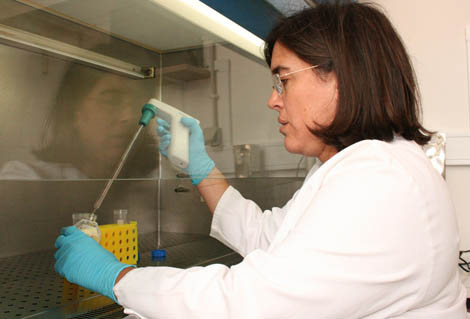 The Foundation of American actor Michael J. Fox has awarded $250 to a team at the University of Coimbra to study the role of the Immune System in Parkinson's Disease.
The Foundation of American actor Michael J. Fox has awarded $250 to a team at the University of Coimbra to study the role of the Immune System in Parkinson's Disease.
The intervention of the immune system, more specifically the implications of genetic mutations in B lymphocytes in Parkinson's disease, is being studied, for the first time, by a team of researchers from the University of Coimbra (UC), through the Center for Neurosciences and Cell Biology (CNC), Faculty of Medicine (FMUC) and Hospital and University Center (CHUC).
The relevance of the investigation was recognized by the Foundation of actor Michael J. Fox, himself a victim of the disease, which allocated $250 to the study.
B lymphocytes (or B cells) are immune system cells with a dual function: they produce antibodies against disease-causing agents and participate in the regulation of the immune response through interaction with other cells.
However, when they undergo genetic mutations, their functions can be affected, with B lymphocytes playing an important role in the aggravation of the disease.
The team focused on studying the mutation of the LRRK2 gene (involved in the communication of B lymphocytes and with other cells) found in patients with Parkinson's disease.
 In a first phase, through the analysis of blood samples from Parkinson's patients, with and without the mutation, and from healthy volunteers, it was discovered that “the mutation seems to stimulate the early death of B cells, making it difficult for them to communicate with other cells. of the immune system. We also found that the gene mutation causes B cells to produce autoreactive antibodies against a central nervous system protein – alpha-synuclein (a protein that helps in the structural stabilization of neurons), making nervous system structures target to slaughter”, says Margarida Carneiro, coordinator of the study.
In a first phase, through the analysis of blood samples from Parkinson's patients, with and without the mutation, and from healthy volunteers, it was discovered that “the mutation seems to stimulate the early death of B cells, making it difficult for them to communicate with other cells. of the immune system. We also found that the gene mutation causes B cells to produce autoreactive antibodies against a central nervous system protein – alpha-synuclein (a protein that helps in the structural stabilization of neurons), making nervous system structures target to slaughter”, says Margarida Carneiro, coordinator of the study.
Knowing that, when mutated, the “commander” gene (LRRK2) of the “cascade” of information signaling in B lymphocytes becomes hyperactive and sends excess signals, causing an excessive chain reaction, the team will now try to understand how it is processed this “short circuit”, with the “objective of finding a way to block excess signaling and prevent the indiscriminate destruction of cells in the nervous system because, by producing too many self-reactive cells, the immune system becomes deregulated”.
In short, the LRRK2 mutation “affects a group of cells and the B lymphocytes no longer fulfill their mission, starting to contribute to the destruction of the brain. By understanding how everything happens, we can advance towards the development of therapies capable of destroying the deregulated lymphocytes, thus allowing to slow down the progression of Parkinson's disease», explains the researcher.
Author: Cristina Pinto (Press Office – University of Coimbra)
Science in the Regional Press – Ciência Viva


















Comments